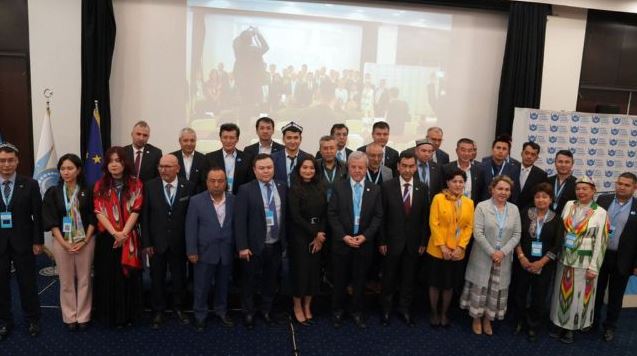The 8th Congress of the major organization of the Uyghur diaspora elected a new leadership. Its task is now more important and difficult than ever.
by Marco Respinti
11/18/2024, Bitter Winter
Recently, the largest organization of the Uyghur diaspora held an important meeting that launched that suffering people into a new stage of advocacy.
The World Uyghur Congress (WUC), based in Munich, Germany, celebrated its 8th congress in Sarajevo, the capital of Bosnia and Herzegovina, on October 24‒27, 2014, to elect its new leaders and officials. WUC ha in fact a President, a Vice President, and several departments including of Uyghur culture, respect for human rights, the right to religious liberty, sport, and youth, each with its own leaders.
Created in Spring 2004 in Munich by leaders of the then World Uyghur Youth Congress, WUC is articulated in chapters in several countries, whose local representatives periodically gather for major events and elections.
On October 26, 176 Uyghur delegates from 27 countries elected 34 members to the WUC new leadership. Of the top officials, Turgunjan Alawdun, a Uyghur from Germany, was elected President, succeeding Dolkun Isa, alongside three Vice Presidents: Zumretay Arkin from Germany, Abdureshit Abdulhamit from Türkiye, and Arkin Akhmetov from Kazakhstan. Rushan Abbas, from the US, was elected chairperson of the Executive Committee.

The new leadership and the delegates reviewed the existing by-laws and voted for the adoption of a new article, no. 17 in WUC’s charter, applicable to all elected delegates. It includes a code of conduct paired with stronger reporting mechanisms.
Living these important moments, as this writer did in Sarajevo, helps strengthening the feeling of transparency and accountability of this important organization working in the crucial field of trying to help an entire suffering people. After twenty years, it seems in fact that WUC has come of age, ready to move a step forward.
The previous leadership did much to internationalize the Uyghur cause, achieving major results in legislative actions, especially in the US, and gaining important recognition in several countries. But the pacific fight of Uyghurs is not over yet. Much needs to be done, and their enemy, the Chinese Communist Party (CCP), knows it all too well. It showed it by trying to physically intimidate delegates and speakers discouraging them from participating in the event in Sarajevo and hacking the email accounts of WUC staff and leaders.

The new presidency needs to move forward to keep focus on the growing cynical eye of the West, so eager to easily forget worthy causes. If internationalizing the Uyghur crisis is most certainly a major win for that harassed people, working for maintaining a constant level of attention among the general public is probably an even harder goal. This is especially true now that important accomplishments may give to several the wrong impression that the largest part of the problem is solved. The new WUC leadership seems to have the necessary stamina and character to do it.

The first bite of this was the conference, entitled “From the Bosnian to the Uyghur Genocide: Lessons Learned” hold on November 25, that served as an introduction to the WUC 8th Congress. Quite a few panelists, including this writer, addressed many aspects of the Uyghur genocide and the way to respond to it internationally. They discussed many topics, from atrocity crimes to transitional justice, from international accountability to genocide denial, from transnational repression to solidarity building.

It was simply another important event in the long, pacific fight for justice and truth. One hopes that suffering people like the Uyghurs may soon stop using their energies to organize themselves around the world and turn to more pleasant topics. It would mean that the atrocious war waged against them by the CCP is over.

